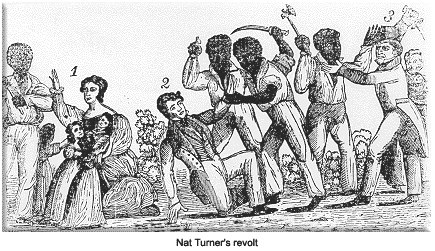Nat Turner was a slave who led a failed 1831 slave rebellion in Southampton County, Virginia. That attempt became a reference to the justification for the Civil War.
Early years
Nat Turner was born on a small plantation in Virginia, owned by slaveholder Benjamin Turner.* Nat's mother was born in Africa and had been shipped to the United States as a slave. She taught her son to hate slavery. His master's son taught Turner to read. He grew up involved deeply in religion and served as a preacher to the slaves around him. Some of the slaves he preached to began to call him "the Prophet," owing to some of his visions; he thought God had communicated to him in dreams.
In 1831, Nat Turner was sold to plantation owner and slaveholder Joseph Travis. In February of that year, an eclipse of the sun convinced Turner that it was a sign from God to start an insurrection, and lead his people out of slavery.
Turner had started planning the uprising that was to take place on July 4, but fell ill, and it had to be postponed. An atmospheric disturbance on August 13, in which the sun appeared bluish-green, served as another sign from God for Turner to commence his uprising.

Some of the slaves were on horseback, so they could run down anyone trying to escape the murderous rampage. The rebels killed all the white people they found, including women, children and the elderly. When the killing finally came to an end, 55 white people lay dead — bludgeoned to death. After 48 hours of rampaging and killing, the band was confronted by armed citizens and the state militia just outside Jerusalem, where most of its members were captured or killed. Nat Turner managed to escape and hid out for six weeks before he was captured. Turner and 16 of his followers were hanged on November 11, 1831.
The aftermath
What followed was a reign of terror against all blacks in Virginia. State and federal troops beat, tortured, and murdered some 200 blacks, many of whom had nothing to do with the rebellion.
Virginians debated over abolishing slavery after the uprising, but instead enacted new slave codes to prevent future uprisings, including strict control of slaves' movements. In addition, educating slaves was outlawed. The long term impact in the south of Nat Turner's rebellion was adverse to Civil Rights before the Civil War.
While in jail, Nat Turner dictated a confession to his attorney, Thomas R. Gray. It was later published.
Nat Turner is regarded as a hero by large numbers of black people worldwide. No slave uprising, before or after the incident, had inflicted such a blow on the ranks of slaveholders and their families in the United States.